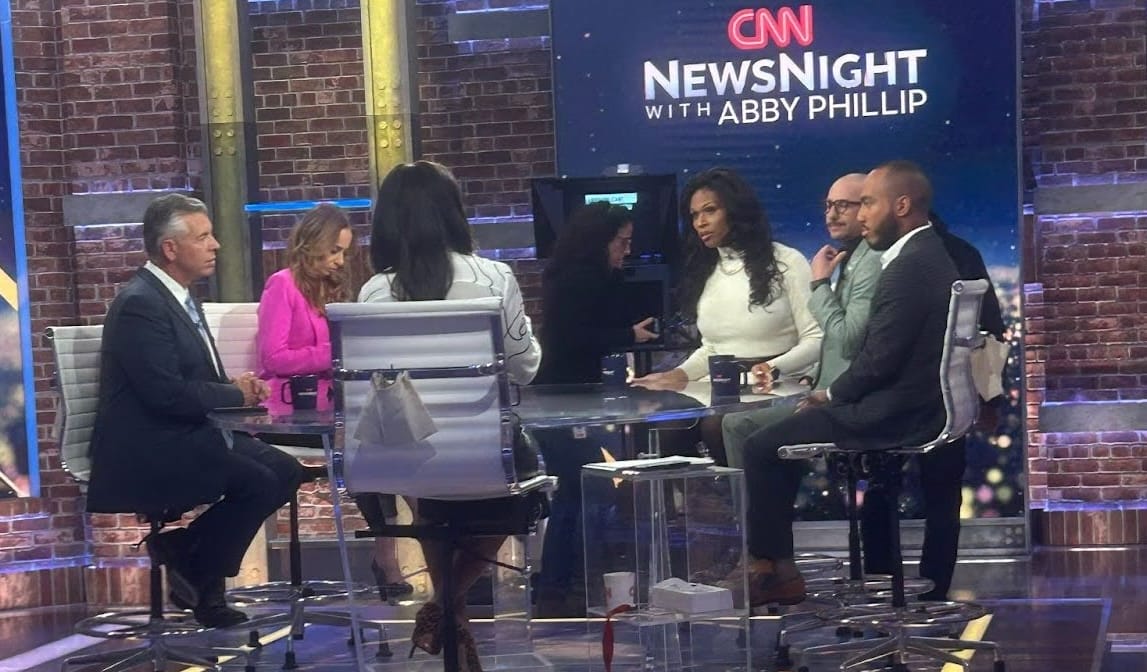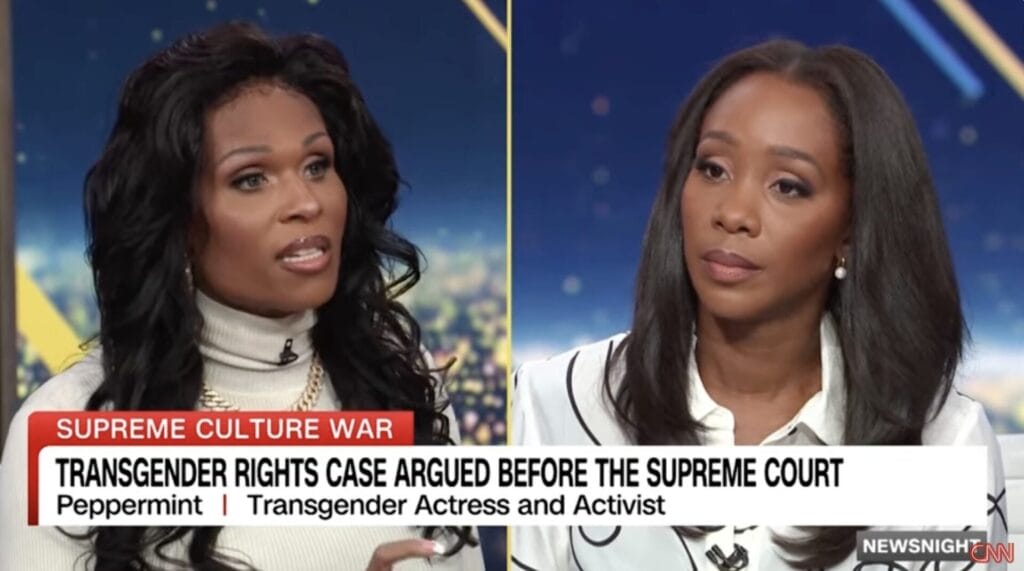Transgender actress, activist and GLAAD Board Member Peppermint and GLAAD Transgender Advocacy Consultant Shane Diamond joined CNN’s NewsNight with Abby Phillip last night in a rare televised live conversation about transgender issues that actually included transgender people themselves.
The U.S. Supreme Court heard oral arguments on Wednesday about Tennessee’s ban that prohibits access to the care for trans youth, while the care remains available to cisgender youth. This disparate treatment is discriminatory and a violation of the Equal Protection Clause of the U.S. Constitution, as argued in the historic hearing by the first out transgender attorney to address the justices, Chase Strangio of the ACLU.

Peppermint led the ACLU’s rally for transgender people outside the Court and broke down the basics of the case on CNN: “Is it fair to discriminate against transgender people and limit access to care because they are trans? That is what this case is.”
Mainstream media has largely excluded the voices of transgender people even as right wing media fills the void with inaccurate, fearful coverage. CNN was among the outlets that did not include trans voices or adequately cover the hundreds of state bills proposed against LGBTQ people, while its conservative contributors spewed harmful rhetoric unchecked or repeated inaccurate claims unchallenged. CNN does not have an on-air contributor who is transgender, despite a dramatic escalation of high profile attacks against the transgender community by Republican candidates in the 2024 presidential and senate campaigns.
CNN broke that streak on Wednesday morning, inviting Minnesota state Rep. Leigh Finke to its Washington bureau for breaking news coverage of the Skrmetti case with host Jim Acosta.
View this post on Instagram
“Gender affirming care is health care,” Rep. Finke said. “ Health care decisions belong in the home, in the doctor’s office, not in the courts, not with politicians. We do not do this for other forms of health care. We are doing it because trans people are trans, and that should be illegal, and I hope the Court finds it so.”
Rep. Finke is Minnesota’s first statewide transgender elected official, who helped draft and pass multiple pieces of legislation accelerating LGBTQ equality and protections. Legislation included protecting access to trans health care, designating Minnesota as a refuge state for people fleeing states with bans on health care, and codifying access to abortion and other reproductive care.
Rep. Finke also appeared with CNN’s Pamela Brown Wednesday morning as the Court heard oral arguments, explaining to the assembled panel: “Gender affirming care is health care that has saved the lives of countless trans people, including myself. The idea that we want to take complicated, emotional health care decisions away from parents and doctors and give them to lawmakers and give them to the courts, I think that is wrong. I hope that the Court understands that these are health care decisions families should be making.”

Wednesday night, CNN’s NewsNight with Abby Phillip invited two transgender Americans to its special guest chairs for the first time, Peppermint and Shane Diamond. Shane is an award-winning impact campaign producer who helped develop the “Here We Are” video campaign introducing transgender people and their families to Americans.
Shane debunked a common myth about the alleged “sudden” rise of gender diverse young people that fuels fear about their mainstream, consensus care.
“We now have more language to describe who we are and how we feel,” Shane said. “We are seeing transgender faces like Peppermint and myself on TV and film and movies, and young people and older people are finally seeing themselves represented, and now have the language to identify how they feel and how they felt. I wouldn’t say there are more young people who are trans or that there is an ‘influx’ of transgender people.”
Peppermint and Shane also corrected the record when panelist Coleman Hughes repeated opponent talking points about some countries in Europe moving to restrict the care. Hughes inaccurately claimed there is “no gold standard” for the care, when health care for transgender people is supported by every major medical association and leading world health authority: statements here.
“We have that gold standard,” Shane said. “This is medical best practice as determined by a number of national and global health organizations that say this type of health care is life saving and medically necessary. We have the data and the receipts to show that this is necessary care for young people.”
Peppermint further explained that none of the countries Hughes mentioned has a blanket ban on care like Tennessee’s, a fact reiterated by legal advocates at the Supreme Court on Wednesday. While the countries evaluate clinical guidelines, they continue to provide the care.
Panelist Julie Roginsky noted the irony of conservatives who demand “parents’ rights” when it comes to banning books they disagree with and opting out of sex education and vaccine mandates, now arguing against parents fighting to make health care decisions for their child.
“Who knows a child better than the parents?” Roginsky asked. “I’m asking you, as a conservative, how can you come in to say no, actually on this one issue, we, the state knows better than the parents.”
Republican governors have called the state bans on care government overreach in vetoing the bills, including in Arkansas and Ohio. Notably the governors also met with patients, families and providers who explained how the care saved lives, conversations that informed their decisions to veto.
While not acknowledging her network’s previous shortcomings in the coverage and exclusion of transgender people, Phillip suggested that trans people may fear coming into settings where they have to defend themselves and their identities with people who don’t know much about them.
“I’m wondering, do you think it’s better to talk about it or to not talk about it?” Phillip asked.
“I think it’s better to learn about it,” Peppermint answered. “It has been highly politicized, and most of the conversations, with the exception of this one, have not involved transgender people in any way, shape or form. Major decisions that impact our bodies, our lives, our families, our health are being made without us being considered at all.”
Peppermint made an appeal for including the people directly impacted in conversations about their lives, including what’s now being decided by nine justices of the U.S. Supreme Court.
“We’re talking about people being able to have bodily autonomy, the right to make decisions about their own body and their own health in conference with their medical providers and their families. And that is where the decisions and the impact of that decision will play out. And so those are the people who have the highest stakes.”
Justices are expected to issue a ruling in June.













